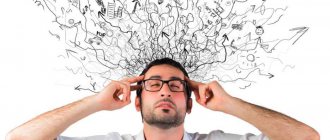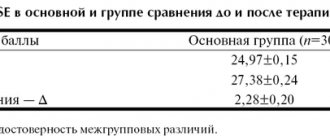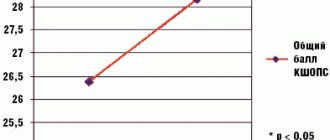Memory is the basis of a person’s personality, a kind of foundation on which his behavior and way of thinking as a whole are built. It ensures the accumulation of new impressions, abilities, skills and their further application. By and large, severe memory impairment is a degradation of personality, since along with memories, habits, desires, aspirations disappear, and life values completely change. Fixation amnesia is one of the forms of mnestic disorders in which the patient does not remember and cannot remember current and recent events; memories of the distant past are partially preserved. The syndrome necessarily requires a comprehensive diagnosis, since doctors at the Leto mental health center determine treatment tactics based on the cause of the disease. Our specialists not only help patients with fixation amnesia, but also provide psychological support to their relatives, who often find it extremely difficult to accept and adequately respond to what is happening.
General description of the syndrome
Despite the huge number of different studies and publications, the process of memorizing and reproducing information is one of the most poorly studied, by the way, which is why the treatment of mnestic syndrome sometimes comes down to supportive and symptomatic therapy.
There are several memory processes:
- Memorization or fixation. This is the ability to form new neural connections, which ensure retention of a certain image in memory. The duration of memory retention is influenced by several factors: the degree of interest, content, well-being and emotional state at the time of receiving information.
- Retention (preservation). This is a kind of “processing” of information, during which everything unnecessary (from the point of view of a particular person) is “discarded” and only its essence remains.
- Playback. This is the process of “retrieving” images from memory. It can be involuntary, for example, some music or smell is associated with a certain event, and voluntary, when a person remembers what is necessary at that particular moment.
- Recognition is the subconscious comparison of a new image with something previously seen or heard.
- Forgetting. This is a completely physiological state when events that are uninteresting for an individual are gradually “erased”.
In patients with fixation amnesia, it is the process of memorizing new information that is impaired, but retention, reproduction and recognition are partially preserved. They do not lose previously acquired professional skills, subconscious reactions, behavior and communication with other people are preserved.
Rehabilitation and lifestyle restoration
Memory loss is psychologically quite difficult for patients to bear. In this case, the rehabilitation process is very important. Specialists help such patients recall the past and remember new information.
Important! In such a difficult period for the patient, the support and understanding of loved ones is necessary. With their help, the recovery process will go much faster.
In addition to special exercises conducted with specialists, the rehabilitation program includes the following:
- Learning poems and songs. You can start with the material you learned in childhood, and then move on to new ones.
- Balanced diet. The menu includes walnuts, wild berries, dark chocolate, carrots, broccoli, seafood, etc.
- Active lifestyle. Sports, dancing, and walks in the fresh air help restore memory.
In addition, regular brain exercises, such as crosswords and puzzles, help.
Causes
In psychiatry and neurology, fixation amnesia is not considered an independent disease; it is rather a syndrome that occurs against the background of a certain pathology. Typically, the etiology of this form of mnestic disorder is associated with:
- acute disorders of cerebral circulation due to stroke, rupture of an aneurysm, chronic cerebral hypoxia is characterized by gradual progression of mnestic disorders;
- traumatic brain injury;
- severe course of certain viral, bacterial or fungal infections, in particular meningitis, encephalitis, syphilis;
- decompensated epilepsy: if the patient either does not see a doctor for a long time, or it is not possible to find effective anticonvulsive therapy, frequent attacks cause severe dysfunction of the central nervous system;
- hepatic, discirculatory encephalopathy;
- acute and chronic intoxication with industrial and household poisons, drugs;
- benign and malignant neoplasms in the brain.
In addition, fixation amnesia is the main symptom of Korsakoff's syndrome. This is a degenerative pathology of the central nervous system, which develops against the background of prolonged deficiency of thiamine (vitamin B1). Vitamin deficiency can be a consequence of prolonged malnutrition, starvation, poor diet, and less commonly, impaired absorption of thiamine in the digestive tract. But the most common cause of Korsakoff syndrome is chronic alcoholism.
Symptoms
Often, amnesia is accompanied by other disorders of the nervous system and cognitive function of the brain, for example, pronounced thought disorders, slurred speech, inability to control attention, anxiety or depression.
Anterograde amnesia
Patients with anterograde amnesia exhibit completely normal behavior upon first meeting, but memory problems are easily identified if recent events are mentioned in conversation.
Retrograde amnesia
People suffering from retrograde amnesia have excellent memory of recent events, but have difficulty remembering events that happened a week or month ago. This form of the disease may not affect events of the distant past, so it is necessary to analyze their memories step by step. The main difficulty in identifying retrograde amnesia is the tendency in many patients to fill in memory gaps with false memories.
Korsakoff's syndrome
The presence of symptoms of Korsakoff's syndrome is indicated by the patient's disorientation in time and space, impaired attention and false memory (the patient reports fictitious events). The most resistant to forgetting information is the memory of self-identification (first name, last name, date and place of birth).
Amnesia, in which the patient does not remember distant events of his past and personal identifying data, is most likely of a psychogenic nature, i.e. caused by serious mental disorders.
Clinical picture
Loss of fixation memory primarily affects the ability to remember current events. In particular, he cannot say what he ate for lunch or breakfast, or retell the content of a movie he just watched or an article he read. At the same time, he is able to quite adequately and logically maintain a conversation with his interlocutor, but after 15–20 minutes he assures that he was not talking to anyone.
The main signs of the syndrome also include severe disorientation. The patient remembers perfectly everything that happened to him before the episode, which provoked mnestic disturbances. But after this, when he wakes up in the morning, he is unable to reconstruct what happened yesterday, and if he is in a hospital, he does not understand where and why he is here.
In addition to impaired short-term memory, fixation amnesia is characterized by symptoms of the underlying disease, which became the cause of this syndrome. It can be:
- dizziness, headaches, which intensify with physical and emotional stress;
- nausea and vomiting;
- deterioration of hearing and speech, partial paralysis of the limbs, loss of sensitivity of the body;
- coordination problems;
- the formation of delusional ideas with the plot of persecution, mastery, jealousy;
- excessive drowsiness or, conversely, insomnia;
- lethargy, weakness, constant fatigue.
Fixation amnesia, which arose against the background of mental disorders, is characterized by confabulation - the replacement of absent memories of recent events with false ones. The patient does this unconsciously: he is convinced that everything was exactly as he says.
Treatment of amnesia
For amnesia, treatment is nonspecific and depends on the cause. Therapy focuses on strategies to help compensate for memory problems. The following approaches are used:
- Treatment of primary pathology: tumor removal, elimination of infection, etc.
- Creation of a favorable environment, normalization of work and rest regimes. After this, the first signs of improvement are visible. For patients with degenerative processes in the brain, this helps them adapt better and increase their ability to self-care.
- Drug therapy. Nootropic drugs, nicotinic acid derivatives, B vitamins, antipsychotics, vasoactive drugs and other drugs may be prescribed.
- Psychotherapy: necessary in the treatment of psychogenic amnesia. Allows you to recognize and work through problems associated with amnestic episodes. Work is carried out with relatives, hypnosuggestive therapy can be used.
Anyone can face risk factors for developing amnesia. Therefore, do not forget about simple preventive measures that will reduce the chance of a painful condition:
- Avoiding excessive alcohol consumption.
- Wearing a seat belt in a car and wearing a helmet when riding motorcycles and bicycles.
- Timely treatment of mental and infectious diseases.
- Seek immediate medical help if symptoms of an acute disorder of the cardiovascular, nervous or respiratory system occur. These symptoms include a sharp headache, increased blood pressure, numbness, partial paralysis and more.
- Seeing a psychotherapist in stressful situations.
- Good habits: regular medical examination, moderate physical activity, balanced diet.
In case of amnesia, only a qualified specialist will tell you what to do - due to the variety of clinical situations, an individual approach to each case is required. If you notice lapses or memory deterioration, do not ignore the problem: the sooner help is provided, the higher the likelihood of its return. But even if this function cannot be restored, modern medicine successfully helps patients stop the progression of the disease, adapt to the new condition and return to social life.
Cost of services
| CONSULTATIONS OF SPECIALISTS | |
| Initial consultation with a psychiatrist (60 min.) | 6,000 rub. |
| Repeated consultation | 5,000 rub. |
| Consultation with a psychiatrist-narcologist (60 min.) | 5,000 rub. |
| Consultation with a psychologist | 3,500 rub. |
| Consultation with Gromova E.V. (50 minutes) | 12,000 rub. |
| PSYCHOTHERAPY | |
| Psychotherapy (session) | 7,000 rub. |
| Psychotherapy (5 sessions) | 30,000 rub. |
| Psychotherapy (10 sessions) | 60,000 rub. |
| Group psychotherapy (3-7 people) | 3,500 rub. |
| Psychotherapy session with E.V. Gromova (50 minutes) | 12,000 rub. |
This list does not contain all prices for services provided by our clinic. The full price list can be found on the “Prices” , or by calling: 8(969)060-93-93. Initial consultation is FREE!
General information
Memory is the highest mental function that allows you to accumulate experience, store information and, if necessary, reproduce it again. The mental process improves with age, reaching optimal development around 20–25 years. Physiological regression is observed after 45–50 years.
When alcohol is abused, its breakdown products selectively accumulate in the central nervous system. Ethanol is highly lipophilic, so it easily penetrates the protective barrier of the brain. During the breakdown of ethanol, a toxic effect occurs on nerve cells, which partially die.
The death of neurons as a result of physiological aging of the body is considered normal. Memory weakens with age - current events or new information are not remembered in full. But under the influence of systematic ethanol poisoning, a large number of neurons die, regardless of age. How many cells are damaged as a result of intoxication depends on the systematic dosage of ethanol.
Alcoholic palimpsest (or perforation amnesia) was first described by K. Bonhoeffer in 1901. He classified this type of amnesia as a mental disorder resulting from the effects of ethanol on the central nervous system. A specific disorder is characterized by the loss of the ability to reproduce the course of events or episodes that occurred during the period of alcohol intoxication. The person does not remember the events that occurred at the time of intoxication. That is, only the general plot is stored in memory.
Narcologists believe that such memory lapses are the first signal of mnestic disorders. Perforation amnesia is considered the beginning of the formation of addiction (stage I).
Perforation amnesia is considered a type of fixation amnesia. Only individual blocks of information are not recorded in memory. With palimpsests, the ability to capture an event and reproduce individual details or episodes that occurred during the period of alcohol intoxication is lost.
Smirnova S.V. Fundamentals of pathopsychology: a textbook for students majoring in “030301-Psychology.” /S.V. Smirnova. – Blagoveshchensk: AmSU Publishing House, 2010. – 32 – 38 p.
Alcohol-induced memory loss becomes more frequent with systematic alcoholism. Palimpsest is the first sign of the development of alcoholism.
Get help now
Do any of your relatives or friends have an addiction? Have you tried in every possible way to help, but as a result the person still returned to his past life?
You are not the first to encounter this problem, and we can help you.
We guarantee anonymity, we will persuade you to undergo treatment, and we will help you choose a center.
Call us
+7
or
Call me
How can you help with amnesia?
Speaking about the treatment of amnesia, it is important to emphasize that if symptoms of memory impairment are detected, it is necessary to seek help from specialists as quickly as possible. The result of therapy will depend on the cause of amnesia, the timeliness of contacting a doctor and the correctness of the selected treatment. Therapy for amnesia should be comprehensive and include: treatment with medications, neuropsychological rehabilitation and psychotherapy. With natural age-related degenerative changes in the brain, complete restoration of memory, unfortunately, is impossible, but a significant slowdown in further memory decline and the process of social maladaptation is more than realistic. It’s just very important to ask for help not too late!
Give yourself and your loved ones many more happy years of life with the opportunity to capture in your memory all the most pleasant and joyful moments!
We constantly detect plagiarism on our materials without providing a clickable follow link to them. In this case, without warning, we turn to Google DMCA , which leads to pessimization of the plagiarist. On the contrary, we welcome the popularization of our materials, but with the obligatory active follow link to this page psyhosoma.com/amneziya/ .
Diagnostics
To make a diagnosis of amnestic syndrome due to alcohol intake (ICD 10 code - F 10.6), the patient is referred for consultation to a neurologist and psychiatrist. Because it is important to carry out a differential diagnosis (exclude organic amnestic syndrome, dementia).
Diagnostic criteria for alcoholic amnesia:
- Memory impairment – amnesia of events, amnestic disorientation;
- No confusion;
- No attention disorders;
- There are no signs of general intellectual decline.
In narcology and psychiatry, amnestic syndrome is divided according to severity (conditionally). Depending on the severity of pathological symptoms, a degree is assigned (mild, moderate, severe).
Diagnosis is carried out mainly by the clinical-amnestic method (history, physical examination) and with the help of psychopathological examination. Instrumental research methods (ultrasound, ECG, EEG) are carried out to assess general physical health. Only a psychiatrist-narcologist has the right to make a diagnosis.
Laboratory diagnostics can only indirectly reflect the fact of alcohol consumption. Therefore, the clinical diagnosis is made on the basis of data from a complex of diagnostic measures.
After a few years, everyday drunkenness turns into alcoholism. The first toxic blow is taken by the nerve cells. Therefore, pathological symptoms of dysfunction of the nervous system initially appear.
Fundamentals of narcology: textbook. Benefit /M. M. Burkin, S. V. Goranskaya. – Petrozavodsk. : Karelia, 2002. – 57 – 62 p.







